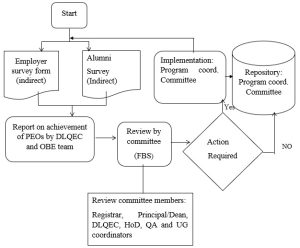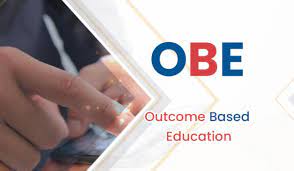OUTCOME BASED EDUCATION
PROGRAMME EDUCATIONAL OBJECTIVES
BE CHEMICAL
The four Programme Educational Objectives (PEOs) form the basis of the Chemical Engineering Programme at SCME, NUST. Within a few years of graduation, the students with bachelor’s in chemical engineering are expected to attain the following.
PEO 1: To acquire competence in Chemical Engineering for successful careers in industrial, entrepreneurial and academic domains.
PEO 2: To pursue research and provide innovative solutions to industrial cum engineering problems.
PEO 3: To address social, economic and environmental challenges through active participation.
PEO 4: To enhancing their professional and technical knowledge through continuing education culminating in lead roles.
Overall view of NUST and SCME vision
| PEO No. | NUST Vision | NUST Mission | SCME Mission | Departmental Mission |
| 1 | ✓ | ✓ | ✓ | ✓ |
| 2 | ✓ | ✓ | ✓ | ✓ |
| 3 | ✓ | ✓ | ✓ | ✓ |
| 4 | ✓ | ✓ | ✓ | ✓ |
PROGRAMME LEARNING OUTCOMES
Twelve Programme Learning Outcomes (PLOs) given in the PEC accreditation manual 2019 are adopted for the BE Chemical Programme.
Programme Learning Outcomes
- Engineering Knowledge
An ability to apply knowledge of mathematics, science, engineering fundamentals and an engineering specialization to the solution of complex engineering problems.
- Problem Analysis
An ability to identify, formulate, research literature, and analyze complex engineering problems reaching substantiated conclusions using first principles of mathematics, natural sciences and engineering sciences.
- Design / Development of Solutions
An ability to design solutions for complex engineering problems and design systems, components or processes that meet specified needs with appropriate consideration for public health and safety, cultural, societal, and environmental considerations.
- Investigation
An ability to investigate complex engineering problems in a methodical way including literature survey, design and conduct of experiments, analysis and interpretation of experimental data, and synthesis of information to derive valid conclusions.
- Modern Tool Usage
An ability to create, select and apply appropriate techniques, resources, and modern engineering and IT tools, including prediction and modeling, to complex engineering activities, with an understanding of the limitations.
- The Engineer and Society
An ability to apply reasoning informed by contextual knowledge to assess societal, health, safety, legal and cultural issues and the consequent responsibilities relevant to professional engineering practice and solution to complex engineering problems.
- Environment and Sustainability
An ability to understand the impact of professional engineering solutions in societal and environmental contexts and demonstrate knowledge of and need for sustainable development.
- Ethics
Apply ethical principles and commit to professional ethics and responsibilities and norms of engineering practice.
- Individual and Teamwork
An ability to work effectively, as an individual or in a team, on multifaceted and /or multidisciplinary settings.
- Communication
An ability to communicate effectively, orally as well as in writing, on complex engineering activities with the engineering community and with society at large, such as being able to comprehend and write effective reports and design documentation, make effective presentations, and give and receive clear instructions.
- Project Management
An ability to demonstrate management skills and apply engineering principles to one’s own work, as a member and/or leader in a team, to manage projects in a multidisciplinary environment.
- Lifelong Learning
An ability to recognize importance of and pursue lifelong learning in the broader context of innovation and technological developments.
Mapping of PLOs to PEOs
The twelve PLOs, defined for the BE Chemical programme, are mapped to the four PEOs. Mapping of the PLOs to PEOs is given in Table below.
Table: Mapping of PLOs and PEOs
| PLO No | Program Learning Outcome | PEO 1 | PEO 2 | PEO 3 | PEO 4 |
| 1 | Engineering Knowledge | ✓ | |||
| 2 | Problem Analysis | ✓ | |||
| 3 | Design / Development of Solutions | ✓ | |||
| 4 | Investigation | ✓ | |||
| 5 | Modern Tool Usage | ✓ | |||
| 6 | The Engineer and Society | ✓ | |||
| 7 | Environment and Sustainability | ✓ | |||
| 8 | Ethics | ✓ | |||
| 9 | Individual and Teamwork | ✓ | |||
| 10 | Communication | ✓ | |||
| 11 | Project Management | ✓ | |||
| 12 | Lifelong Learning | ✓ |
Process to Evaluate Achievement of PEOs
The overall process of data gathering, analysis, KPIs achievement and continuous quality improvement (CQI) of PEOs is shown in Figure



